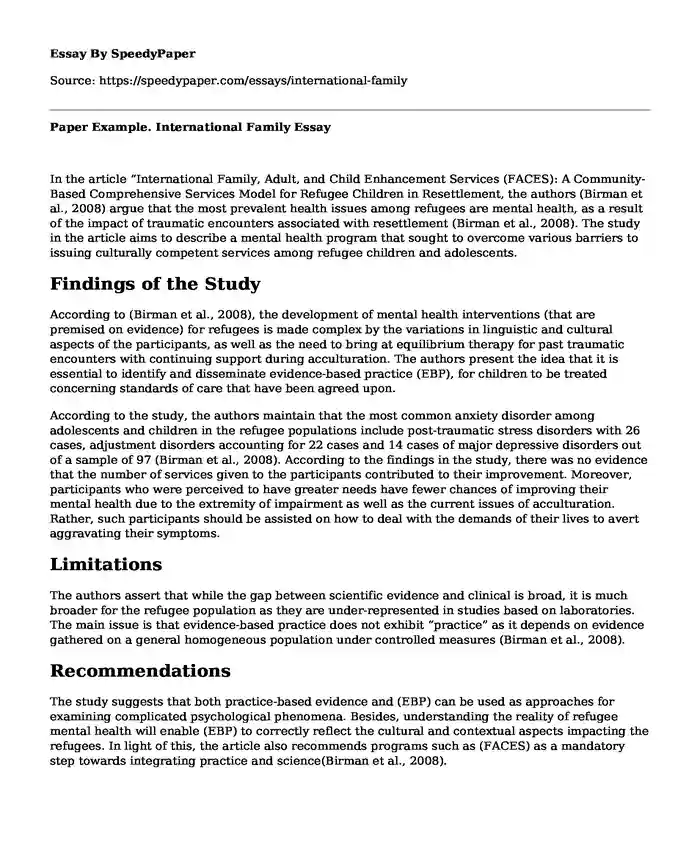
| Type of paper: | Essay |
| Categories: | Immigration Family Relationship Public health |
| Pages: | 2 |
| Wordcount: | 466 words |
In the article “International Family, Adult, and Child Enhancement Services (FACES): A Community-Based Comprehensive Services Model for Refugee Children in Resettlement, the authors (Birman et al., 2008) argue that the most prevalent health issues among refugees are mental health, as a result of the impact of traumatic encounters associated with resettlement (Birman et al., 2008). The study in the article aims to describe a mental health program that sought to overcome various barriers to issuing culturally competent services among refugee children and adolescents.
Findings of the Study
According to (Birman et al., 2008), the development of mental health interventions (that are premised on evidence) for refugees is made complex by the variations in linguistic and cultural aspects of the participants, as well as the need to bring at equilibrium therapy for past traumatic encounters with continuing support during acculturation. The authors present the idea that it is essential to identify and disseminate evidence-based practice (EBP), for children to be treated concerning standards of care that have been agreed upon.
According to the study, the authors maintain that the most common anxiety disorder among adolescents and children in the refugee populations include post-traumatic stress disorders with 26 cases, adjustment disorders accounting for 22 cases and 14 cases of major depressive disorders out of a sample of 97 (Birman et al., 2008). According to the findings in the study, there was no evidence that the number of services given to the participants contributed to their improvement. Moreover, participants who were perceived to have greater needs have fewer chances of improving their mental health due to the extremity of impairment as well as the current issues of acculturation. Rather, such participants should be assisted on how to deal with the demands of their lives to avert aggravating their symptoms.
Limitations
The authors assert that while the gap between scientific evidence and clinical is broad, it is much broader for the refugee population as they are under-represented in studies based on laboratories. The main issue is that evidence-based practice does not exhibit “practice” as it depends on evidence gathered on a general homogeneous population under controlled measures (Birman et al., 2008).
Recommendations
The study suggests that both practice-based evidence and (EBP) can be used as approaches for examining complicated psychological phenomena. Besides, understanding the reality of refugee mental health will enable (EBP) to correctly reflect the cultural and contextual aspects impacting the refugees. In light of this, the article also recommends programs such as (FACES) as a mandatory step towards integrating practice and science(Birman et al., 2008).
References
Birman, D., Beehler, S., Harris, E. M., Frazier, S., Atkins, M., Blanton, S., ... & Buwalda, J. (2008). International Family, Adult, and Child Enhancement Services (FACES): A communitybased comprehensive services model for refugee children in resettlement. American Journal of Orthopsychiatry, 78(1), 121-132.
Cite this page
Paper Example. International Family. (2023, Aug 24). Retrieved from https://speedypaper.com/essays/international-family
Request Removal
If you are the original author of this essay and no longer wish to have it published on the SpeedyPaper website, please click below to request its removal:
- Essay Example: Health Goals Research
- Essay Example on Gender and Family
- Essay Example in History: Revolution in China
- Free Essay Example - the Place of Technology in the 21st Century
- Free Essay: The Symptoms of Generalized Anxiety Disorder
- Discrimination: A Drag on Business Success - Essay Sample
- Pathophysiology of Parkinson's Disease - Essay Sample
Popular categories




